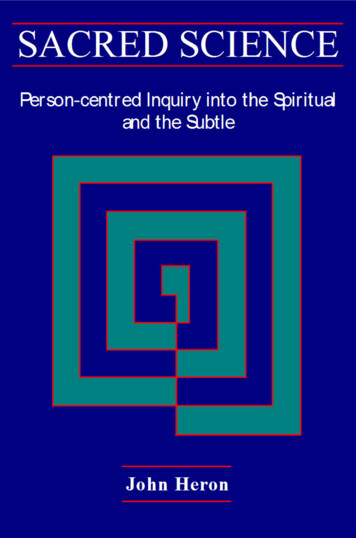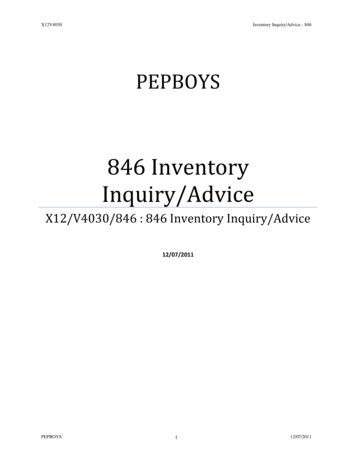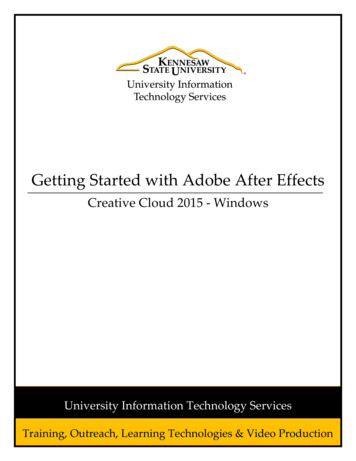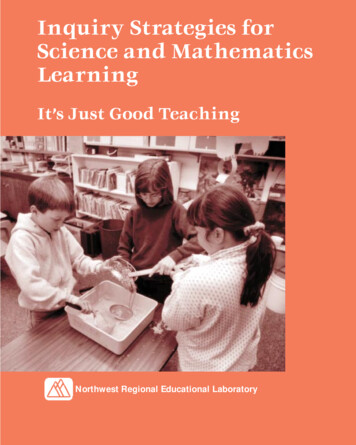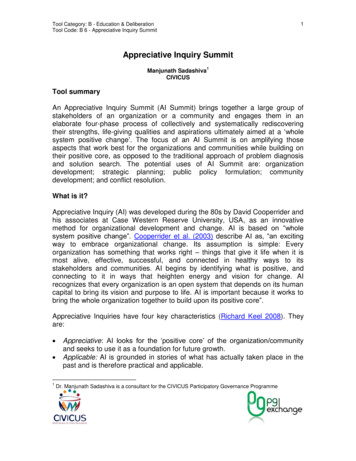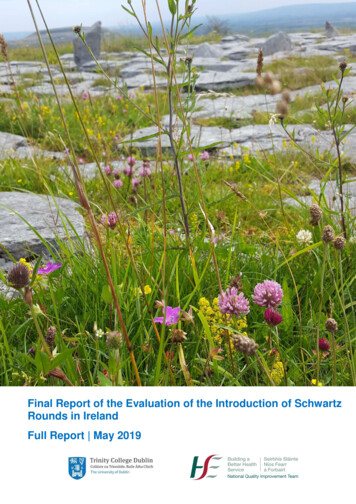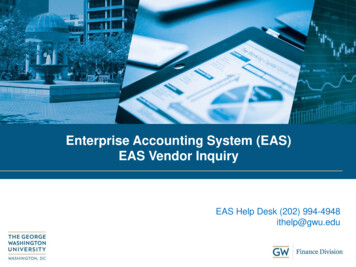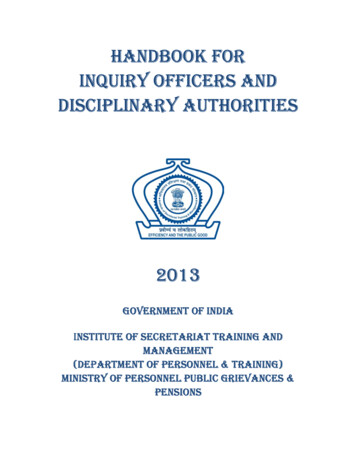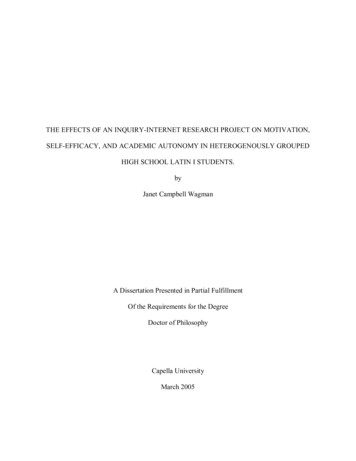
Transcription
THE EFFECTS OF AN INQUIRY-INTERNET RESEARCH PROJECT ON MOTIVATION,SELF-EFFICACY, AND ACADEMIC AUTONOMY IN HETEROGENOUSLY GROUPEDHIGH SCHOOL LATIN I STUDENTS.byJanet Campbell WagmanA Dissertation Presented in Partial FulfillmentOf the Requirements for the DegreeDoctor of PhilosophyCapella UniversityMarch 2005
Janet Campbell Wagman, 2005
AbstractThe purpose of this study was to analyze and induce change to lessen the achievementgap in heterogeneously grouped high school Latin classes, which included students at academicrisk due to insufficient knowledge, inability to connect with the subject, and poor performances.The researcher engaged in action research, a branch of qualitative research, to determine ifexperiential learning methodologies, such as inquiry and research, could increase motivation,self-efficacy, and academic autonomy in two classes of Latin I students. The total number ofstudent participants was 48, ranging from grades 9 through 11 with an even distribution betweenmales and females and ethnicity predominantly dichotomized between students of Europeandescent and African descent. Using the WebQuest model as the means to understand phenomenaand facilitate change, the researcher created an inquiry-internet research project titled CurLatina? The researcher recorded the participants' (teacher and students) ostensible behavior andperceptions concerning motivation, self-efficacy, and academic autonomy during theirengagement in the Cur Latina? project. The researcher collected data via observations,performance assessments, a questionnaire, and interviews. The observation and performanceassessment results of the study revealed that the Cur Latina? project helped students achievecompetence in an interrelated area within the Latin I curriculum. Results from the questionnaireand interviews revealed that the students perceived their motivation, self-efficacy, and academicautonomy to have increased because their individual areas of expertise were integrated into theEcce Romani Latin I textbook and would continue to be employed throughout the Latin I course.Additional results from student questionnaires and interviews revealed that many students
preferred holistically presented information with knowledge building upon itself in its relation toa greater whole. Perceiving the search for connected knowledge to be a personal as well as anaccomplishable task enhanced the students’ academic autonomy and motivation to learn.Recommendations for further study include additional studies that would elucidate affectiveelements of such subjects as Latin, Ancient Greek, Sanskrit, and Old English, where theemphasis is on the written language. Qualitative studies concerning affective states of mind, suchas self-efficacy, motivation, and academic autonomy, which can function as catalysts to learningin the moribund and dead language classroom, would be beneficial in discerning similarities anddifferences from this study in order to note confluent patterns that teachers can use to enhancelanguage learning in their classrooms. Qualitative studies on the effectiveness of integratinginquiry learning and technology would also be beneficial to understanding learning in themoribund and dead language classroom.
Table of ContentsTable of ContentsivList of TablesviiList of FiguresviiiCHAPTER 1: INTRODUCTION1Introduction to the Study1Background of the Study3Statement of the Problem4Purpose of the Study5Significance of the Study9Nature of the Study10Assumptions10Limitations12Definition of Terms12CHAPTER 2: LITERATURE REVIEW19Introduction19Goal Orientation20Temperament, Self-Concept, and Self-Efficacy22Attributions28Intrinsic/Extrinsic Motivation29Motivational Factors in Language Learning31iv
Transfer of Learning34Learner-Centered Approaches38Classroom Assessment51WebQuest Technology59Summary61CHAPTER 3: METHODOLOGY63Introduction63Description of Methodology63Research Context and Design65Project Description69Research Participants72Procedures and Instrumentation Used in Data Collection77Data Analysis81Summary83CHAPTER 4: DATA COLLECTION AND ANALYIS84Introduction84Data Collection and Descriptions85Observations86Performance Assessment101Student Questionnaire105Interviews108Propositions119v
Summary123CHAPTER 5: SUMMARY, CONCLUSION, ENDIX A. Cur Latina?144APPENDIX B. Student Survey150APPENDIX C. Project and Presentation Requirements151APPENDIX D. WebQuest Questionnaire153APPENDIX E. Interview Questions154APPENDIX F. Roman Weaponry156APPENDIX G. Models of Ancient Roman Medical Tools159APPENDIX H. Ancient Roman Fashion: The Elegant Journal160APPENDIX I. Latin Language162APPENDIX J. Ancient Roman Swords (Gladius)164APPENDIX K. Ancient Roman Board Game: Latrunculi165vi
List of TablesTable 1. WebQuest Inquiry Model.7Table 2. Observation Foci.77Table 3. Question 1.106Table 4. Question 2.106Table 5. Question 3.107Table 6. Question 4.107Table 7. Question 5.107Table 8. Question 6.108Table 9. Question 7.108Table 10. Segmentation of Tasks in the Cur Latina? WebQuest.127vii
List of FiguresFigure 1. Age73Figure 2. Grade Levels73Figure 3. Gender74Figure 4. Ethnicity.74Figure F1. PowerPoint Handout 1156Figure F2. PowerPoint Handout 2157Figure F2. Onager158Figure G. Ancient Roman Medical Tools159Figure H1. PowerPoint Handout 1160Figure H2. PowerPoint Handout 2161Figure I1. PowerPoint Handout 1162Figure I2. PowerPoint Handout 2163Figure J. Ancient Roman Swords (Gladius)164Figure K. Latrunculi165viii
CHAPTER 1. INTRODUCTIONFor the things we have to learn before we can do them, we learn by doing them.-Aristotle, Nicomachean EthicsIntroduction to the StudyThe Tower of the Forty Dhrakos and the King of the Golden Apple is a Greek folktalewhose various versions were orally transmitted for generations until Garnett (1913), retaining thetheme of personal empowerment found in the versions collected throughout Greece, publishedher comprehensive written version in the early part of the twentieth century. The folktalerecounts the story of an indolent young man named Phiaka who was good for nothing. He wouldneither work, nor learn a vocation. One day, as he was sitting outdoors eating bread and honey, amultitude of flies descended toward his food. He reached out with one hand and swatted fiftyflies. With his other hand, he swatted one hundred more. He marveled at his dexterity andstrength in killing one hundred and fifty flies, and his newly acquired confidence galvanized himto seek a new life in which he felt he could be so much more.When Phiaka told his elderly mother of his plan, she provided him with a few essentials,and inwardly rejoiced that she was finally ridding herself of her useless son. Phiaka journeyed farfrom his beginnings. He met fearsome Dhrakos (latter-day Cyclopes), a three-headed serpent, awild boar, and he engaged in arduous tasks. As he succeeded in each dangerous quest, hisconfidence, competence, wit, and dynamic ability increased. He believed there was so much hecould do. Ultimately, he was rewarded for his assiduousness by being appointed king of all theDhrakos.
Effects of an Inquiry-Internet2Phiaka's tale is replete with metaphoric images that reflect the human condition. Phiakaperceives his experience with the flies to be an epiphany that transforms his life. As theembodiment of the reluctant student, Phiaka comes closer to defeating indolence and developinghis inner sense of accomplishment and autonomy with each internal obstacle he vanquishes.Metaphoric analogies help students engage in relational learning, which is important in theretention and transfer of learning. Metaphoric thought derives from inquiry and divergentthought, which lie at the heart of connecting ideas that are seemingly unequivocal, but areactually analogous if one inquires and can perceive fundamental associations. Associationsamong ideas and experiences are endemic to the focus of this study, in which Latin studentsengaged in inquiry research as they increased self-efficacy, competence, and academic autonomyin a particular cultural or linguistic subject associated with their study of the Latin language.Metaphorical analogies that reframe and transfer ideas and concepts to new situationsrequire thinkers to compare, contrast, synthesize, and evaluate meaning (Pugh, Hicks, Davis, &Venstra, 1992). Metaphorical analogies not only exist in the shared themes of humanity, but inthe individual cognitive and affective experiences of human beings, as exemplified in a student'scomparison of newly learned material with prior knowledge in an attempt to transfer theunknown into the realm of the known, thereby creating meaningful knowledge. Students'attempts at contextualizing information have been discovered to be consistently successful intransferring learning from one context to another analogous context (Salomon & Perkins, 1989).Suchman (1972) also posited that human beings are intrinsically compelled to discover answersto create meaning and enhance autonomy in their lives.
Effects of an Inquiry-Internet3A substantial, profound, and critically reflective learning experience is essential todeveloping an intrinsic and consistent desire to strive for mastery of specific learning goals.Information, however, can be imbued with intricate complexities, and its acquisition andtransformation into something useful can be time intensive. Learning that is self-guided andheuristic compels students to think deeply, consider it from various perspectives, manipulate it,and use it to create personal meaning (Suchman, 1972). This is in accordance with Aristotle'sconception of the realization of one's potential in developing one's moral and intellectual virtueby learning through authentic experience.Students encounter varying levels of difficulty in making sense of complicated concepts.Providing students of varying abilities with the means through which they can inquire anddevelop their own perspectives on certain aspects of their learning is important for them to growas self-directed learners. Possessing the motivation, self-regulation and self-direction to thinkabout concepts in relation to phenomena that are entirely different is indicative of an independentand autonomous learner. This study attempted to understand the dynamics involved in the studyof Latin I to determine if experiential learning methodologies, such as inquiry and research,could increase motivation, self-efficacy, and academic autonomy in Latin I students, and if thesefactors would transcend to other aspects of Latin study.Background of the StudyThe successful study of Latin in high schools with diverse populations can be impactedby various external factors. For example, approximately one third of the students in Latin Iclasses at a Georgia High School, located 30 miles southeast of Atlanta, are academically
Effects of an Inquiry-Internet4disaffected or linguistically impoverished. This number is expected to increase as the populationchanges to accommodate the burgeoning city, which is enveloping the county. These studentseither selected or were placed in Latin I classes because they failed Spanish, French, or bothlanguages. Students who are average to above average in language skills constitute the rest of theclass.Prior to this school year, students were allowed to drop a language after one term. Thisyear, the students must stay a full year in language classes. In traditional Latin courses, whichdemand a sophisticated level of self-regulation and commitment, some students could or wouldnot adapt, and they did not develop a strong reason to persevere. Consequently, they chose to failor not pursue Latin II. The traditional environment was exclusive, in that only those personalitiesthat naturally flourished or those personalities that were adaptive could regulate themselves tothe traditional environment.Statement of the ProblemSome students in heterogeneously grouped Latin classes are at risk due to lack ofbackground knowledge, current academic abilities, or inability to connect with the subject. TheLatin language contains more morphological forms than modern Romance languages offered inhigh school, and students can have difficulty allotting the time necessary for diligent study.Rather than risk appearing ignorant, they will not ask questions, and will fall further behind.
Effects of an Inquiry-Internet5There are additional motivational factors that hinder some students' progress, such as thefollowing:1. Academic motivation can decrease as students approach and enter adolescence(Cordova and Lepper, 1996, Hidi & Harackiewicz, 2000, Lumsden, 1994).2. Learning can become associated with monotony and isolation (Cordova & Lepper,1996).3. Students attribute their self-efficacy and self-esteem to past failures and successes;those who have failed (perceived or real) at one language are not often motivated totry again at another language (Hareli & Weiner, 2002).Lack of knowledge and poor performances sustain and escalate one another until learners believethey also lack efficacy to be able to learn any aspect of Latin.Research QuestionCan experiential methodologies integrated into the core of the Latin I curriculum enhancestudent motivation, self-efficacy, and academic autonomy in a heterogeneously grouped Latin Iclass?Purpose of the StudyIf average and struggling learners substantially increase self-efficacy in one area, such asresearch strategies and specific knowledge developed through the Cur Latina? WebQuest, it canenhance self-regulation for studying vocabulary, grammar, and persevering through difficulttranslations (Deci, Vallarand, Pelletier, & Ryan, 1991). In the Latin classroom, the textbook isimportant because it offers a consistent knowledge base of vocabulary and readings thatrecursively employ morphological and syntactical patterns; however, to create an enhanced
Effects of an Inquiry-Internet6environment in which the students could engage in inquiry and research concerning complicatedissues with multiple perspectives, the students should look outside the textbook (Bruce &Bishop, 2002). Including alternative methods of teaching and learning can broaden the milieu inwhich many personalities and learning styles may thrive.Linnenbrink and Pintrich (2002) suggested that instructors create instructional tasks thatare challenging, yet achievable so that all learners could be successful in some aspect of thesubject being studied. The Cur Latina? WebQuest (Appendix A) is an inquiry-based Internetresearch project designed to facilitate collaborative and independent critical thinking skills(Dodge, 1997; March, 2004). It is one model from a variety of inquiry designs, described byHmelo-Silver (2002), created to help students develop proficient critical and creative thinkingskills (Table 1). Lepper (1988) asserted that research has suggested that computer-based learningenvironments enhance motivation by prolonging engagement and, thereby, reinforcing learning.Aligning inquiry learning and technology to create a heuristic learning experience engageslearners cognitively, behaviorally, and motivationally (Linnenbrink & Pintrich, 2002).
Effects of an Inquiry-Internet7Table 1WebQuest Inquiry ModelWebQuest ComponentsDescriptionProblemA salient question forms the core of research.MethodologyThe schema emphasizes inquiry, information retrieval,reasoned analysis, and collaboration.ProcessThe process focuses upon facts and ideas, which areanalyzed logically, interpretively, and reflectively. Theresults are synthesized into a new perspective, product orproject.Instructor's RoleThe instructor facilitates through observation and guidedinquiry.Materials/EquipmentComputer-based.In a classroom with academically diverse learners, allowing them to work on additionalprojects, in which they may set their own level of proficiency, acknowledges student autonomyand intellectual inimitableness. Students display increased curiosity, competence, and autonomywhen they engage in an activity or task as the impetus for learning; and interest in an activity ortask greatly enhances a learner's cognitive memory (Lepper, 1988). Lepper also concluded thatlearners possessing intrinsic motivation would choose challenging activities that require a greatdeal of concentration and commitment. Cur Latina? allowed the students to connect aspects ofancient Roman culture to their personal interests, that is culinary, architectural, and so on.Alternative methods that attract and retain students of varying abilities by appealing totheir desires for personal "autonomy, competence, and relatedness" might also heighten their
Effects of an Inquiry-Internet8motivation toward ancient literature and culture (Kasser, 2002, p. 137). Linnenbrink and Pintrich(2003) described two reciprocally occurring "motivational constructs" that could increaselearning: interest and competence (p. 132). Previously held interests can increase an individual'stendency to engage in related learning, which can develop into self-efficacy; conversely, alearner's competence in an area can develop into interest in that area (Linnenbrink & Pintrich).Motivation could therefore be maintained through either catalyst: interest or competence.The Cur Latina? project was designed to span several months during the first term ofschool to add a multi-modal dimension to inquiry learning, and to engage the students inacademically self-autonomous behaviors. Young and Wilson (2002) emphasized the importanceof integrating the WebQuest into the broader course curriculum. In its emphasis on thebackground and influences of the Latin language and classical culture upon Western society, theCur Latina? WebQuest merged with the Latin I curriculum. It offered high school students aheuristic approach to learning in which the students could become classroom authorities (viainquiry, research, and presentation) on their chosen aspect of classical culture or Latin language.WebQuest inquiry focuses on self-determined learning, and the strategies created bylearners to manage and complete demanding tasks that threaten their self-efficacy (Hmelo-Silver,2004; Young & Wilson, 2002). Hmelo-Silver (2004) mentioned that students often experiencedifficulty in problem solving before and during the research process; therefore, many first yearLatin students need help structuring their research. The separating of each Cur Latina? task intoa sub-task provided scaffolding necessary for students who possessed weak self-regulation(Hmelo-Silver, 2004).
Effects of an Inquiry-Internet9Students could take advantage of the hyperlinks and the rubric embedded in theWebQuest, as well as collaborative inquiry with peers and the instructor. The scaffolding wasavailable for those students who needed support in researching, extrapolating salient information,analyzing the data, and synthesizing it into relevant knowledge. The scaffolding was also presentto accommodate the various developmental levels displayed by the students (Vygotsky, 1978)and to stimulate their metacognitive skills to realistically assess, plan, and monitor strategies forlearning (Greene & Land, 2000).Establishing a milieu where motivation could be induced and enhanced, therebyheightening elements that influence it, such as interest, competence (self-determination), goalorientation, temperament, anxiety, attribution, self-efficacy, and self-determination encouragedstudents to persevere through other difficult aspects of Latin study (Ormrod, 1999). Institutingaspects of experiential learning and technology into the Latin curriculum helped to create anenvironment where students cooperatively learned and supported one another while they useddiverse materials and gathered resources in the goal of becoming self-determined learners(McLoughlin & Luca, 2002).Significance of the StudyThe Latin I teachers in the targeted school system are employing the WebQuest this year.One teacher was observed through action research to determine whether the project integratedwell with the curriculum. Latin is academically challenging. Many students are capable of thechallenge, but are not cognizant of their ability. There was a need to collaborate, observe, anddocument behaviors and attitudes of the students toward learning in order to gain a broader
Effects of an Inquiry-Internet10perspective of the problem. The research was two-fold: understand the phenomena concerningwhat motivated the students, and help them develop academic autonomy. The Cur Latina?WebQuest was scrutinized to ascertain liabilities or assets incurred as a result of its inclusion intoa high school Latin I course of instruction.Nature of the StudyAction research is a form of qualitative research that attempts to understand a situationand make necessary changes. For this study, the researcher, teacher and students engaged inaction research to understand and institute changes in teaching and learning in a heterogeneousenvironment. Gall, Gall, and Borg (2003) stated that action research conducted for personalreasons possesses a primary goal of enhancing the practitioner's practice. Prior to the CurLatina? project being instituted as a countywide endeavor next year, it was important to ascertainits validity as an educational vehicle that adds to the Latin curriculum, not detracts due to thetime invested in it. The results of the project were analyzed to ensure that the project retained itsemphasis as a vehicle of intellectual value that prompted students to use their higher levels ofcognitive thinking.AssumptionsThe assumptions a researcher possesses permeate his or her interpretations of a researchstudy’s results (Rowan, 2001). The qualitative data that derived from dialectic aspects ofdiscussions compelled the researcher and the teacher to question and transform their assumptions
Effects of an Inquiry-Internet11as the action proceeded. Including students as participants increased the richness of the data, andpossibilities for the examination of personal assumptions.Ideological AssumptionsThe overarching ideological assumption that propelled this research was the researcher'sbelief that academic inclusion of all students within a Latin class is necessary to broaden theirintellectual and ideological perceptions. A democratic milieu increases each student'saccountability as a contributing member of the class (Hoover, 2000). Offering a fully inclusivelearning environment enhanced the students' opportunities to engage in the questioning ofpersonal assumptions and collaborative inquiry on an iterative and heuristic level. Knowledgeabout the past helped learners discern confluent and diametric beliefs on a continuum, whichincreased critical reflection concerning their own firmly held assumptions about the world.Methodological AssumptionsIn this study, statistical records of students’ performances could not explain the reasonsunderlying students’ behaviors and attitudes. Qualitative methodology, such as action research,allowed the researcher and participants to work together toward a solution in whichunderstanding the problems and instituting progressive ameliorations was essential. Including thestudents’ interpretations of phenomena compelled the researcher and teacher to alter theirpreconceived ideological and methodological assumptions. Observations, performanceassessments, a questionnaire, and interviews provided reliability through the clarity andrepetition of these instruments (Appendixes C, D, & E). Validity of the research results was
Effects of an Inquiry-Internet12achieved through triangulation, multiple sources of data that derived from careful inspection andinterpretation.LimitationsThe researcher conducted action research to explore educational practice in a localizedsetting, a county public school system. The purpose of the research was to understand andchange the ways in which educators and students viewed their own practices. As participants in adialectical approach to learning, they attempted to generate a distinct "epistemology of practice"(McNiff, 2002, p. 54). The research results cannot be generalized to a broad population, but mustbe localized to the Latin students attending the county public schools targeted in the study, whereall language classes are heterogeneous, and the populations that constitute each high school aresimilar.Definition of TermsThe following definitions are limited to their relevance within educational milieus.Action Research. A type of qualitative or applied research in which practitioners seek tounderstand and improve their educational practice. It is often achieved through critical selfinquiry and reflection, and is participatory in its inclusion of participants as fellow researchers.Affective Research. The study of perceptions, feelings, values, attitudes and resultantbehaviors that are elicited from a student's academic experiences.Alternative Assessment. Instruction and assessment are integrated and used as asubjective means of assessing each student contextually and interdependently. It allows
Effects of an Inquiry-Internet13educators to construct higher-order thinking tasks in conjunction with assessments that have realworld application.Andragogy. The theory and practice of learning and teaching. It is associated with theteaching of adults.Authentic Assessment. Assessing students by how well they perform or solve real-worldtasks or problems.Case Study. Investigation and explication of interrelated factors inherent in a particularsocial entity, such as a specific group of students.Collaborative Learning. A learning method, activity or learning environment in whichlearners of varying abilities provide each other with guidance and information to collaborativelyachieve a mutual goal, arrive at a solution to a problem, or the culmination of a project.Cognitive Research. The exploration of how people learn.Constructivism. A form of experiential learning, in which students learn by constructingtheir own knowledge through the integration of new information into prior knowledge. It alsoemphasizes the contextual nature of learning and students' attitudes and actions toward a learningsituation.Contextualized Learning. The connecting of information so that learners perceive its realworld application and can relate that learning to their personal frames of reference.Critical Reflection. Explicit awareness and examination of one's own assumptions.Decontextualization. The teaching and learning of information as separate unitsdisconnected from one another, and the real world.
Effects of an Inquiry-Internet14Experiential Learning. A theory in which individuals learn by interacting with theirenvironment and connecting new experiences to past ones. Learning is increased by observing,inquiring, acting, reflecting, and teaching others.External Validity. The degree to which the findings of a study can be generalized to asimilar situation.Extrinsic Motivation. Motivation derives from an extraneous source, rather than fromwithin the individual or the task to be executed.Formative Assessment. Learners are evaluated as they engage in learning; evaluation isongoing and within context. Learners are provided with guidance and feedback as they criticallyreflect on their learning strategies in order to amend them.Generalizability. The ability to equate research findings to similar circumstances.Heterogeneous Grouping. The grouping of students with various abilities, interests, andsometimes age.Heuristics. A method or approach to a problem in which learners use their pastexperiences and experimentation to discover solutions or answers to problems.Higher-Order Thinking Skills. Teaching students by providing them with multipleopportunities to practice and enhance their understanding of complex concepts that involve theanalysis, synthesis, and evaluation of learned information.Inquiry-Based Learning. There are various models, but each consists of an iterativeprocess in which learners use prior knowledge to explore an issue or a problem, or ask aquestion. Through discussion or investigation, they create a project or engage in a critical andcollaborative discussion with other learners. Learners use their own experiences to guide them to
Effects of an Inquiry-Internet15reflect and augment their thought processes or projects. This generates new questions to exploreand ameliorate.Internal Validity. Research data accurately reflects the phenomena it aspires to analyze ormeasure.Intrinsic Motivation. Motivation derives from within the individual or the task to beexecuted.Learning Styles. Individuals possess varying degrees of learning preferences that areexpressed through such senses and perspectives as visual, auditory, kinesthetic, tactile,analytical, and holistic.Metacognition. Cognizance of and ability to control and adjust one’s own thinkingprocesses and knowledge base in relation to one’s intellectual and emotional state of being.Multiple Intelligences. An expansive view of intelligence that includes eight anatomicallyseparate yet interrelated intelligences: verbal-linguistic, logical-mathematical, spatial, musical,bodily-kinesthetic, intrapersonal, interpersonal, and naturalistic.Pedagogy. The theory and practice of teaching and learning. Often associated withchildren and adolescents.Qualitative Research. An overarching term that encompasses a variety of researchmethodologies that possess common characteristics and focus on the underlying opinions,values, and stimuli that influences an individual's perceptions and behaviors.Reflection-in-Action. Individuals attempt to connect prior experience, affective emotions,and current personal theoretical assumptions simultaneously while attempting to understand andengage in a phenomenon to alter it.
Effects of an Inquiry-Internet16Reflection-on-Action. Allows the educator to discern underlying aspects of the action
Capella University March 2005 ' Janet Campbell Wagman, 2005. Abstract . classes at a Georgia High School, located 30 miles southeast of Atlanta, are academically . 4t e n r e t n I - y r i u q n I n a f o s t c e f f E disaffected or linguistically impoverished. This number is expected to increase as the population



